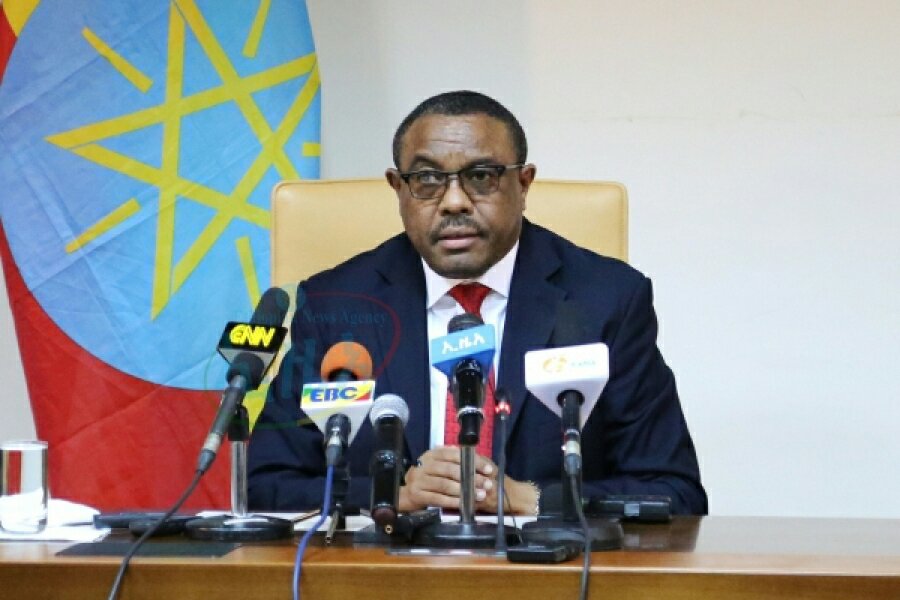Ethiopian Prime Minister Hailemariam Desalegn announced his intent to resign today. The announcement came after an emergency session of the EPRDF Executive Committee formally endorsed his resignation this morning.
Hailemariam will remain in his posts until a new Chairperson and Prime Minister are elected by the 180-member EPRDF Council and the Parliament, respectively, he added.
In a statement to state-media, the Prime Minister said his resignation is meant to help the ruling party’s effort to reform and address public grievances, without elaborating how.

Hailemariam’s resignation comes in the middle of a “deep gimgema” (appraisal) session of EPRDF member parties.
EPRDF had launched a “deep reform” process in mid-2016, following months of unrest in the country, and achieved little success in strengthening the leadership or stabilizing the country.
Last December, following the about 40 days long marathon meeting of TPLF/EPRDF, the EPRDF Executive Committee met for 17 days and decided to launch “deep gimgema” which is described as a process to deepen the reform process. The rest three parties of EPRDF – ANDM, OPDO and SEPDM, followed suit.
ANDM’s Central Committee started its meeting in January 20 and have been going on since then, except for a few days interruption to due to unrest in eastern parts of the region. The meeting have covered organizational appraisal and group discussion phases and have embarked on individual criticism and self-criticism session, according to HornAffairs’ sources.
OPDO’s Central Committee held a 10-days long meeting from January 26 to February 5. However, it focused mostly on general appraisals of the party performance. HornAffairs’ sources indicated, the Central Committee would meet again for thorough individual criticism and self-criticism session but a date hasn’t been fixed yet.
SEPDM, Hailemariam’s party, started its Central Committee meeting on February 5. It has conducted general appraisals and embarked on individual criticisms earlier this week.
HornAffairs’ sources claim SEPDM leadership strongly criticised Hailemariam for making their party “irrelevant” amid an ethnic power struggle dominated by Amhara, Oromo and Tigrayan actors.
Hailemariam himself was disheartened by his government’s inability to stop a series of ethnic attacks on several groups including the Wolayta from which he hails.
It is not clear if either of the two reasons were the primary reason for his resignation.
The premier is also criticised for alleged indecisiveness in carrying through the decisions of the EPRDF executive committee. Though, it can be argued, the disarray in the top leadership would have impaired any other person.
The resignation of a head of government is a rare occurrence in Ethiopia’s history. Hailemariam’s announcement came at a period of heightened ethno-national sentiments and power struggle.
It is difficult to predict the next EPRDF Chairperson and Prime Minister, as the EPRDF have yet to wrap up the deep gimgema sessions. TPLF, which provided the late Prime Minister Meles Zenawi, would not present a nominee for the top job.
The fact that Hailemariam didn’t finish his term is raised as an argument in favor of a nominee from SEPDM. Since the party is an amalgamation of about 45 ethno-linguistic groups, SEPDM can not be easily disregarded from consideration.
ANDM, which held the post of Dep. Chairperson of EPRDF and Dep. PM, for 25 of the last 27 years could claim the top post. OPDO, which runs the largest and populous region, have a strong claim to the top job, as the Oromos rarely took that role in recent history.
The yet-to-completed deep gimgema and the possibility of leadership change adds another unknown into the equation, at least in the case of ANDM and SEPDM and perhaps also of OPDO.
********





